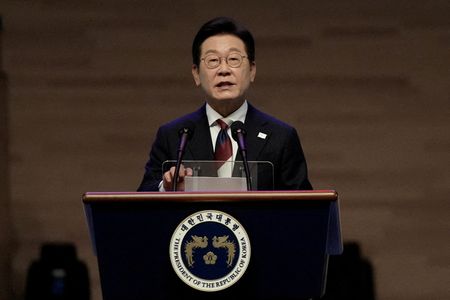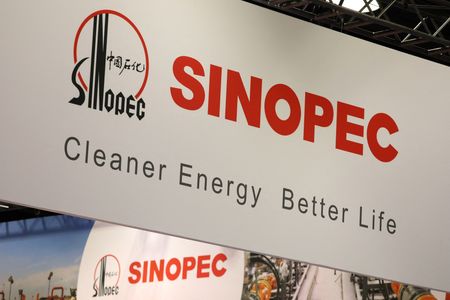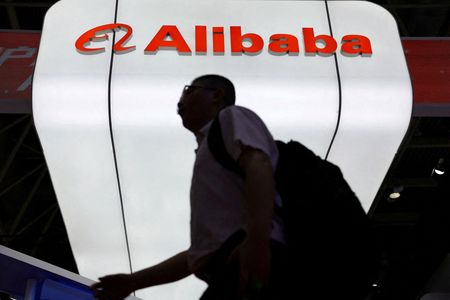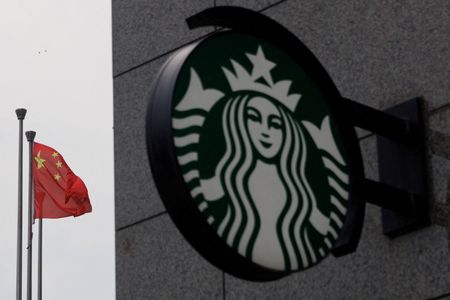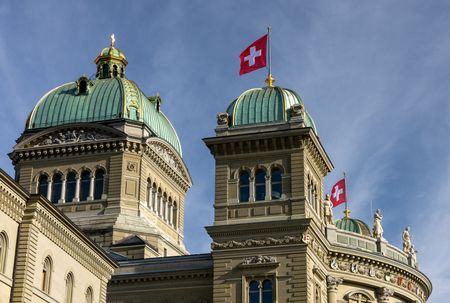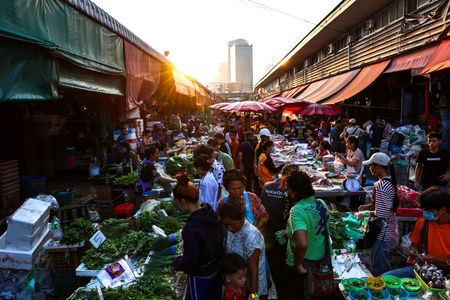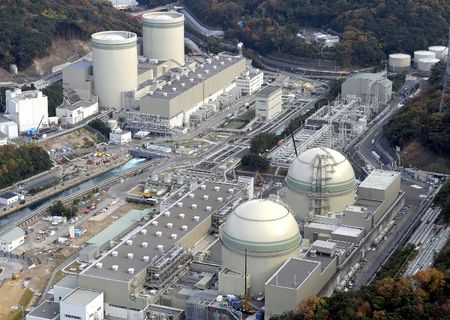By Heejin Kim and Jihoon Lee
SEOUL (Reuters) – South Korean President Lee Jae Myung said on Thursday he would not pursue plans to revise a capital gains tax on stock investments, conceding that the move risked undermining the market and reaffirming a promise of reform to revitalise it.
The plans had sparked a public backlash from many South Korean investors, but Lee told a press conference he now considered it unnecessary to lower the threshold defining “large shareholders” liable to pay the tax.
“If it causes damage to the stock market, I don’t think it is necessary to lower the threshold to 1 billion (won) from 5 billion,” Lee said, adding that he would leave the decision to parliament, now reviewing the proposal.
Both the ruling Democratic Party and the main opposition People Power Party agree that the threshold should stay unchanged.
The benchmark KOSPI index rebounded from an initial fall after Lee’s comments, to trade up 0.5% at 3,331.24 points by 0536 GMT.
It hit an all-time closing high of 3,314.53 on Wednesday, fuelled by expectations for Lee to scrap the plan at the press conference.
Lee vowed a stern response to unfair trading practices such as price manipulation, among measures to tackle the so-called “Korea Discount”.
The term refers to undervaluation of South Korean companies against global peers, due to factors such as opaque governance structures and low dividend payouts.
Lee floated the idea that the National Pension Service, the world’s third-largest with assets of 1,269.2 trillion won ($913 billion), should step up investment in domestic stocks.
He said he did not understand its policy of increasing overseas assets to avoid affecting the domestic market, as he feared that doing so would cost the fund an opportunity.
“It is buying foreign stocks because there are concerns of a domestic market slump when it needs to sell two to three decades from now,” Lee said.
“It sounds reasonable, but it is 30 years from now, by when stock prices will rise.”
Lee’s administration still plans to raise the tax on stock market transactions to 0.2% from 0.15% now, as proposed in July.
In the domestic stock market, heavy selling by retail investors near the end of each year, intended to avoid the large shareholder threshold, is often cited by analysts as a factor in downward pressure on the benchmark index.
‘KOSPI 5,000’ PUSH
Investors have seen market reform pushes by Lee, who said on Thursday that he himself was considering raising investment in the domestic stock market, as stronger than those of the previous administration.
Such efforts include expanding the duty of board members to protect shareholder interests and setting up a task force to secure developed market status from a global index provider through improvements to foreign access, seen as more likely to bring real changes, along the lines of Japan’s reforms.
“There is growing optimism that the market will continue to perform strongly on the back of reform improvements, as we have witnessed in Japan,” said Jon Withaar, a hedge fund manager at Pictet Asset Management, based in Singapore.
Lee’s very strong mandate and very clear focus on his ‘KOSPI 5,000 agenda’ were contributing factors, he added.
“The corporate governance reform agenda of the current government has been setting a strong foundation for change,” said Sojung Park, a fund manager at Matthews Asia. “There are signs of more to come.”
Foreign investors have bought local shares worth 3 trillion won in September, extending their buying streak to a fifth straight month.
The KOSPI has risen 39% this year, outperforming Wall Street’s major indices as well as peers in Japan and Taiwan, also at record highs.
($1=1,389.7100 won)
(Reporting by Heejin Kim and Jihoon Lee in Seoul, Ankur Banerjee and Gregor Stuart Hunter in Singapore; Editing by Ed Davies and Clarence Fernandez)

